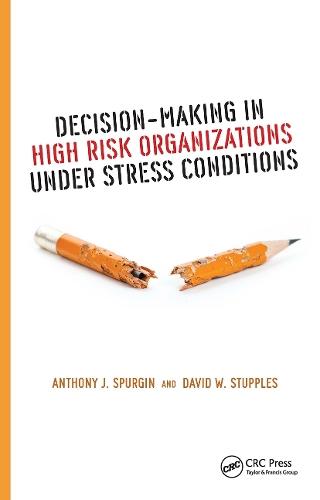Overview
This book discusses management decision-making under accident conditions as a vehicle to confirm the importance of clear decision-making guided by a systems approach on how an organization functions related to the role of managers, operators, and the operation of the plant. The book shows how to effectively assess the reliability of an organization particularly those organizations responsible for critical infrastructure. The authors have used Stafford Beer’s cybernetic model as a basis to model the behavior and reliability of such organizations. A series of case studies are used to draw conclusions not only how training, experience, and education can improve the strategy and response of management to reduce the probability of an economic or social disaster, but also draw attention to the fact that managers need to be made aware of the consequences of their decisions. Poor management decisions made under stress conditions can lead to the collapse of an organization together with its underlying business, possibly linked to a social disaster with loss of life. Some technology-ignorant management decisions even under non-stress conditions can lead to dangerous situations, which can increase the economic burden placed on an organization. This book describes such situations in order to promote improvement in organizational preparedness by training, experience, and education to reduce safety and economic risks. This book offers: • Case studies of accidents that have affected different HROs (high-risk organizations) and others, due to poor decision-making by management • Training methods (advocated by Admiral Hyman Rickover, adopted by military bodies and others) to prepare staff to make critical decisions under difficult conditions and examine their applicability to training managers of high-risk facilities • Documentation on how making decisions in difficult situations have psychological constraints related to the degree of preparedness and the tools available to aid the decision maker(s) • Studies on the key actions taken before, during, and after accidents and how these management decisions can affect accident propagation, and how one could improve management decision-making by the use of training in decision-making and an understanding of Ross Ashby’s Law of Requisite Variety. • Simulation techniques to improve training of front-line operators and management • Consideration of cost and investment evaluations and how they can distort the selection of tactics and measures that ensure successful operations and avoidance of accidents
Full Product Details
Author: Anthony J. Spurgin (Independent Consultant, San Diegeo, California, USA) ,
David W. Stupples (City University of London, UK)
Publisher: Taylor & Francis Ltd
Imprint: CRC Press
Weight: 0.349kg
ISBN: 9781032929231
ISBN 10: 1032929235
Pages: 190
Publication Date: 14 October 2024
Audience:
College/higher education
,
Professional and scholarly
,
Tertiary & Higher Education
,
Professional & Vocational
Format: Paperback
Publisher's Status: Active
Availability: In Print

This item will be ordered in for you from one of our suppliers. Upon receipt, we will promptly dispatch it out to you. For in store availability, please contact us.
Author Information
Dr. Anthony Spurgin is an independent consultant in the fields of risk assessment, human reliability, and control system design. Dr. David W. Stupples is a Professor in the Department of Mathematics and Engineering at City University, UK.




